人教版七年级下册期末复习语法点Unit7-12课件(共42张PPT)
文档属性
| 名称 | 人教版七年级下册期末复习语法点Unit7-12课件(共42张PPT) |  | |
| 格式 | pptx | ||
| 文件大小 | 4.5MB | ||
| 资源类型 | 教案 | ||
| 版本资源 | 人教新目标(Go for it)版 | ||
| 科目 | 英语 | ||
| 更新时间 | 2024-06-25 16:04:43 | ||
图片预览

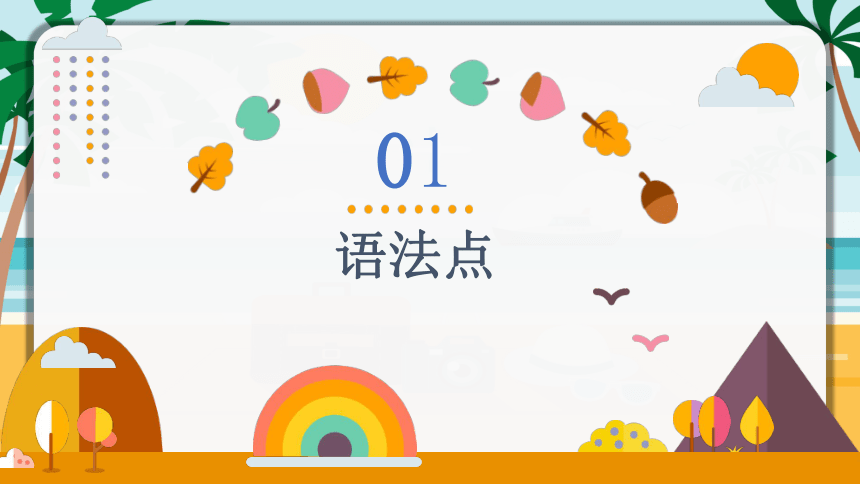
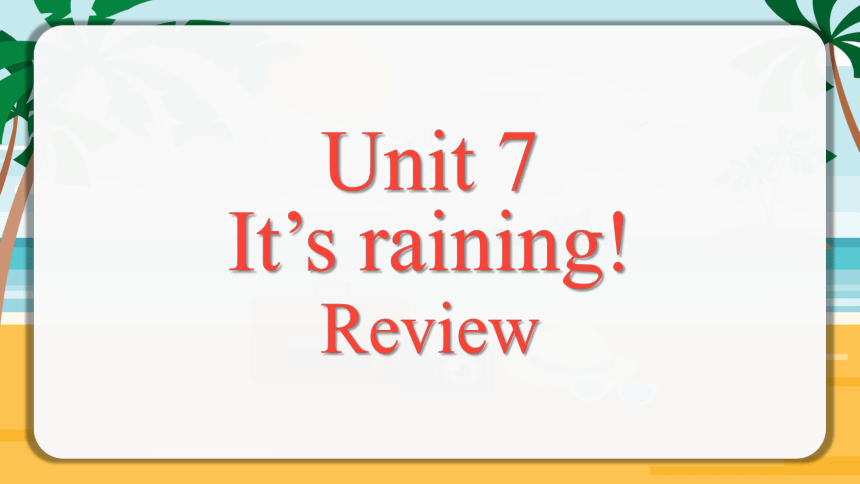

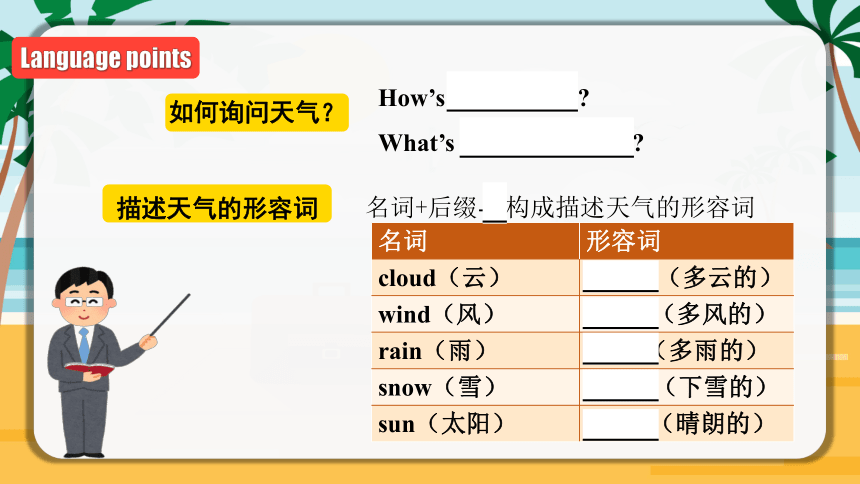
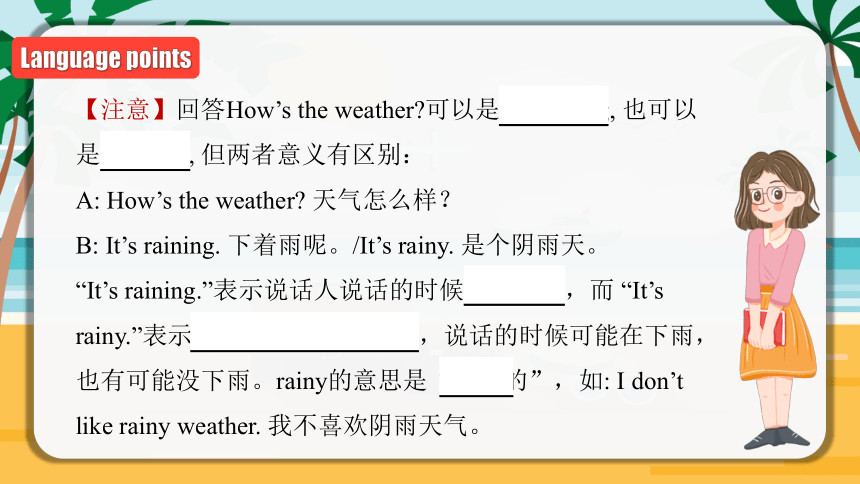


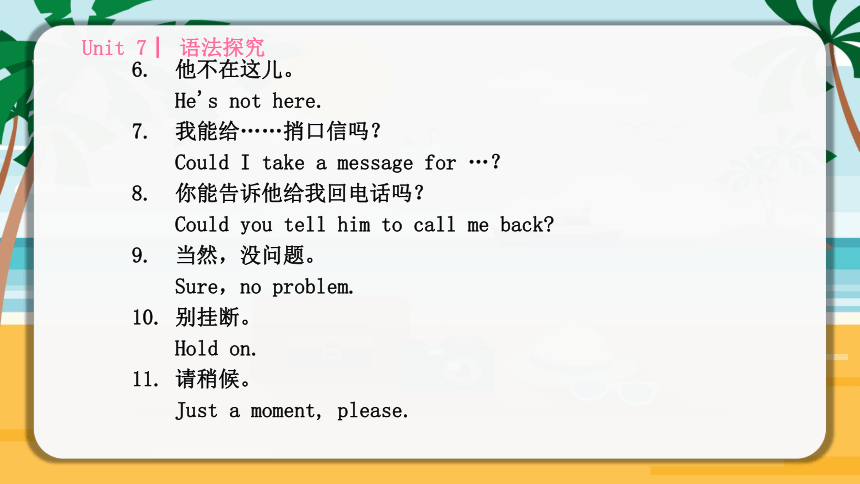
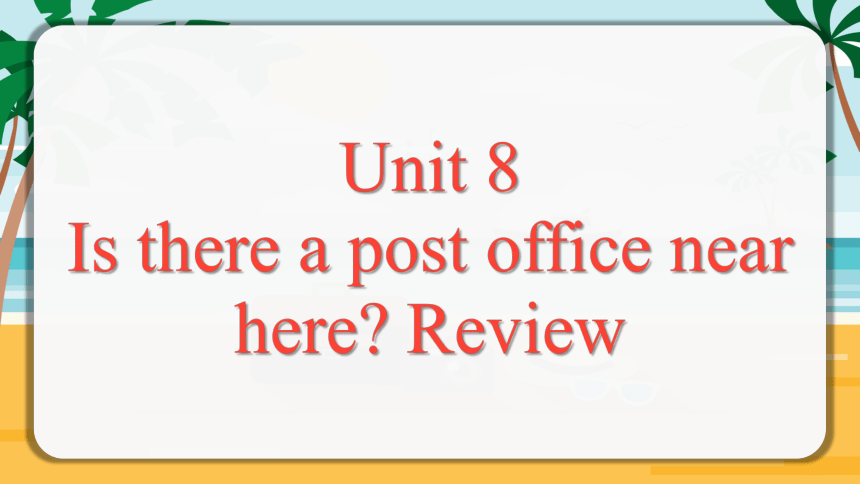
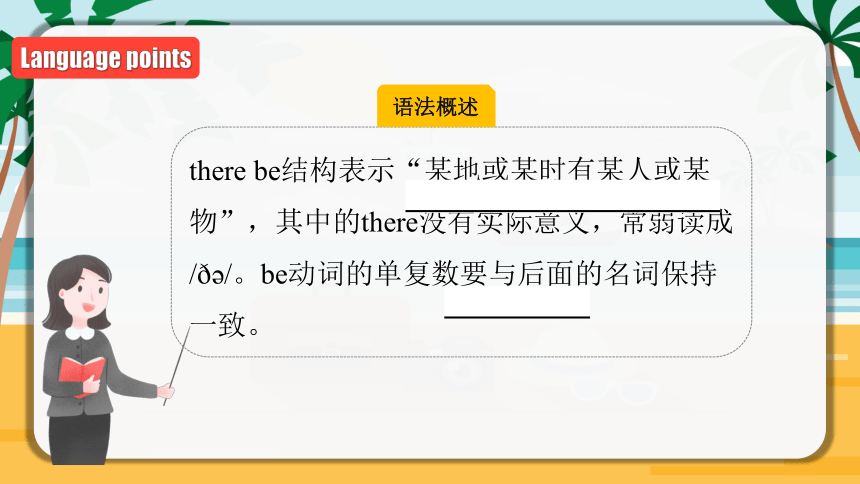
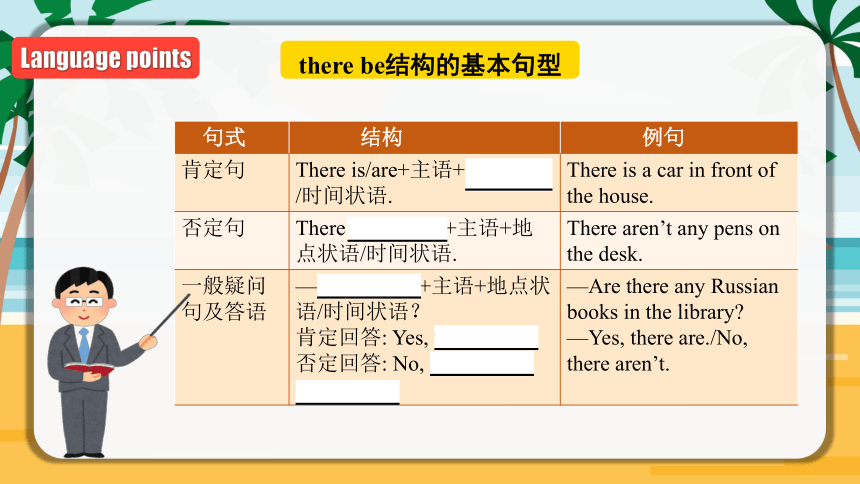
文档简介
(共42张PPT)
人教版七下期末复习
u7-u12
语法点
语法点
01
Unit 7
It’s raining!
Review
Language points
现在进行时和一般现在时的比较
现在进行时 一般现在时
概念
构成
时间状语或标志词
表示现在或现阶段正在进行的动作。
表示经常性或习惯性的动作或存在的状态,也表示主语具备的性格和能力,或陈述客观真理。
主语+be(am/is/are)+现在分词+其他.
主语+be(am/is/are)+其他.
主语+行为动词+其他.
now, right now等。
every day, often, usually, always, sometimes, in the morning等。
Language points
How’s the weather
What’s the weather like
如何询问天气?
描述天气的形容词
名词+后缀-y 构成描述天气的形容词
名词 形容词
cloud(云) cloudy(多云的)
wind(风) windy(多风的)
rain(雨) rainy(多雨的)
snow(雪) snowy(下雪的)
sun(太阳) sunny(晴朗的)
Language points
【注意】回答How’s the weather 可以是It’s raining, 也可以是It’s rainy, 但两者意义有区别:
A: How’s the weather 天气怎么样?
B: It’s raining. 下着雨呢。/It’s rainy. 是个阴雨天。
“It’s raining.”表示说话人说话的时候正在下雨,而 “It’s rainy.”表示某段时间是阴雨天气,说话的时候可能在下雨,也有可能没下雨。rainy的意思是“多雨的”,如: I don’t like rainy weather. 我不喜欢阴雨天气。
┃语法探究┃
Ⅰ.有关天气的表达:
询问天气的句型: How's the weather =What's the weather like
常见天气的描述:
1. 晴朗:
It's sunny./The sun is shining brightly.
2. 阴天: It's cloudy.
3. 刮风: It's windy./The wind is blowing.
4. 下雨: It's raining/rainy.
5. 下雪: It's snowing/snowy.
Unit 7┃ 语法探究
Ⅱ.电话常用语
1. 我是…… This is… (speaking).
2. 你是……吗? Is that … (speaking)
3. 是的,我就是。 Yes,speaking.
4. 请问您是谁? Who is that speaking
5. 我可以和……讲话吗? May I speak to …?
Unit 7┃ 语法探究
6. 他不在这儿。
He's not here.
7. 我能给……捎口信吗?
Could I take a message for …?
8. 你能告诉他给我回电话吗?
Could you tell him to call me back
9. 当然,没问题。
Sure,no problem.
10. 别挂断。
Hold on.
11. 请稍候。
Just a moment, please.
Unit 8
Is there a post office near here Review
Language points
there be结构表示“某地或某时有某人或某物”,其中的there没有实际意义,常弱读成/ /。be动词的单复数要与后面的名词保持一致。
语法概述
Language points
句式 结构 例句
肯定句 There is/are+主语+地点状语/时间状语. There is a car in front of the house.
否定句 There isn’t/aren’t+主语+地点状语/时间状语. There aren’t any pens on the desk.
一般疑问句及答语 —Is/Are there+主语+地点状语/时间状语? 肯定回答: Yes, there is/are. 否定回答: No, there isn’t/aren’t. —Are there any Russian books in the library
—Yes, there are./No, there aren’t.
there be结构的基本句型
Language points
there be结构中的be动词要和其后的名词在数上保持一致。
在there be 结构中,如果be动词后的主语为可数名词单数或不可数名词,be动词用is。
There is a man under the tree. 树下有一个人。
There is some milk in the bottle. 瓶子里有一些牛奶。
如果be动词后的主语为可数名词复数,be动词用复数形式。
There are many trees in the park. 公园里有很多树。
there be结构的主谓一致
1
2
如果be动词后面的主语为两个或两个以上的名词,be动词要和离它最近的那个名词在数上保持一致,即遵循“就近原则”。
There is a ruler and two erasers on the desk. 桌子上有一把尺子和两块橡皮。
There are two erasers and one ruler on the desk. 桌子上有两块橡皮和一把尺子。
3
Exercise
一、用be动词的适当形式填空。
1
2
3
4
—______ there any pictures on the wall
—Yes, there _______.
There _____ some water in the glass.
There ______ a book and two rulers on the desk.
There _____ some books and a pen on the chair.
Are
is
is
are
are
Exercise
二、单项选择
1
2
3
【2020·青海省】—________ an amusement center, some restaurants and hundreds of stores in the shopping mall.
—Wow, it’s amazing. I will go next week.
A. There is B. There are C. There will be
—Lucy, there _____ too many things on the desk. What a mess!
—Sorry, Mum. I’ll put them away.
A. have B. is C. are
—Is there a bank near here
—Yes, _________.
A. there is B. there isn’t C. it is
C
A
A
Exercise
There is a pay phone near the school.(改为一般疑问句)
________ ______ a pay phone near the school
The bank is across from the hotel. (对画线部分提问)
_______ ______ the bank
Is there a bird in the tree (作否定回答)
No, _____ ________.
三、按要求完成句子,每空一词
Is there
Where is
1
2
3
there isn’t
Unit 9
What does he look like
Review
Language points
描述某人的身高:主语+be of+形容词+height.
Our math teacher is of medium height. 我们的数学老师中等身高。
描述某人的体型:主语+be+形容词.
Lily is very short and thin. 莉莉很瘦小。
描述某人某一身体部位的特征:主语+have/has+形容词+表示身体部位的名词.
My mother has curly hair. 我妈妈留着卷发。
描述外貌的常用表达
1
2
3
Language points
4
描述某人的穿着打扮:主语+wear(s)+glasses/表示衣着的名词.
My sister wears glasses. 我妹妹戴着眼镜。
【拓展延伸】多个描述性形容词修饰名词时的排列顺序:
限定词
评述性词
大小形状
新旧
颜色
产地
材料
作用类别
限定词包括冠词(a, an, the)、物主代词、指示代词(this, that, these, those)和数词等,评述性形容词有cold, beautiful, great等。
two beautiful new green silk evening dresses 两件又新又漂亮的绿色丝绸晚礼服
Language points
一般疑问句用yes或no来回答;选择疑问句的两个选择项则用or连接,回答时不能用yes或no回答,而是根据实际情况选择符合事实的陈述句。
一般疑问句和选择疑问句
Exercise
一、用所给词的适当形式填空
1
2
3
4
—What does she look like
—She _____________ (have) curly hair.
My friend ______ (be) short and thin.
Does she ______ (have) long straight hair
______ (be) they tall or short in your class
has
have
is
Are
Exercise
1
2
3
【2020·连云港】—___________ is Ricky like
—He’s humorous He often tells us funny jokes.
A. He B. What C. Which D. Who
Bill _____ short hair and he ____ of medium height.
A. have; is B. has; is C. is; is
【2020·鄂州市】Although the man is in his eighties, he grows vegetables ________ in his garden.
A. in public B. in person C. in silence D. in fact
B
B
B
二、单项选择
Exercise
Jeff is short and thin. (对画线部分提问)
______ ______ Jeff ______ ______
He is tall. He has short curly hair. (合并为一句)
He ______ a tall boy ______ short curly hair.
【2020·牡丹江、鸡西地区】My uncle is tall and wear glasses. (对划线部分提问)
________ does your uncle look ________
三、按要求完成句子,每空一词
What does look like
is with
1
2
3
What like
Unit 10
I’d like some noodles.
Review
Language points
would like sth.
would like sth.喜欢/想要某物
would like to do sth.想要做某事
would like sb. (not) to do sth.想要某人(不)做某事
I’d like some milk to drink. 我想喝点牛奶。
I would like to be a great writer. 我想成为一名伟大的作家。
I’d like you to be more careful when you drive. 我希望你开车时能更加小心。
would like 意为“愿意;喜欢”,与want意义相近,但比want语气更委婉、 更正式。would like可与任何人称连用,没有人称和数的变化;与人称代词连用时,would可缩写为“’d”。
would like
Language points
We use a or an before a singualr countable noun. If the noun starts with a vowel sound, we use an.
I want to buy a hamburger cake.
an egg.
orange.
More examples:
an hour
a US ship
an old dog
a friend
Language points
To form the plural of most countable nouns, we add -s to the singular form. However, there are some exceptions.
Most nouns + s cake cakes
Nouns ending in a consonant + y 去掉y + ies story stories
Nouns ending in s, sh, ch or x + es bus buses wish wishes
match matches box boxes
Nouns ending in o + s or + es photo photos potato potatoes
tomato tomatoes
Nouns ending in f or fe 去掉f / fe + ves half halves life lives
Exercise
Fresh water ________ more important than anything else.
A. is B. are C. was D. were
Mike doesn’t have enough money, so he can only afford____________.
A. a bread B. too much bread C. a piece of bread
— ______ would you like
— A glass of orange juice.
A. What B. Where C. How D. When
一、单项选择
1
2
3
A
A
C
Exercise
Gina: Mum, I'm hungry!
Mum: Oh, it's time to cook dinner. ___21___ for dinner
Gina: I'd like noodles.
Mum: ___22___
Gina: I'd like noodles with eggs and tomatoes.
Mum: I see. Can you help me wash the tomatoes
Gina: ___23___. Where did you buy them They're nice and fresh.
Mum: In the supermarket.
Gina: Mum, are you free tomorrow
Mum: Tomorrow ___24___ is it then
Gina: It's Saturday. Shall we go shopping
Mum: Sounds good! ___25___ to bring a shopping bag!
Gina: And my shopping list. Haha!
21. What would you like to eat
22. What kind of noodles do you like
23. OK.
24. What day
25. Don't forget
Unit 11
How was your school trip Review
Language points
一般过去时表示过去某个时间发生的动作或存在的状态,常与yesterday, last Sunday等表示过去的时间状语连用。
语法概述
一般过去时
... ago, yesterday, the day before yesterday, yesterday morning/afternoon /evening, last year/month/week/Sunday..., in 2019/2021...in the past,just now
Language points
一般过去时的句式
含be动词的一般过去时的句式
肯定句 主语 + was/were + 其他.
否定句 主语 + was not( wasn’t)/were not( weren’t) + 其他.
一般疑问句及其回答 Was/Were + 主语 + 其他
Yes, 主语 + was/were.
No, 主语 + wasn’t/weren’t.
I was late for school yesterday. 昨天我上学迟到了。
My parents weren’t interested in pop songs. 我父母对流行歌曲不感兴趣。
—Was your father at home 你爸爸在家吗?
— Yes, he was. /No, he wasn’t. 是的,他在家。/ 不,他不在家。
Language points
含实义动词的一般过去时的句式
We went to the farm last weekend. 上周末我们去农场了。
Tom didn’t go to work this morning. 汤姆今天上午没去上班。
Did you ride a horse 你骑过马吗?
Yes, I did. /No, I didn’t. 是的,我骑过。/不,我没骑过。
肯定句 主语 + 动词过去式 + 其他.
否定句 主语 + did not(didn’t) + 动词原形 + 其他.
一般疑问句及其回答 Did+ 主语 + 动词原形 + 其他
Yes, 主语 + did. / No, 主语 + didn’t.
【特别提醒】若陈述句的主语是第一人称,变疑问句时应改为第二人称,句末改为问号。
I played football with my friends yesterday afternoon. 昨天下午我和我的朋友们踢足球了。
Did you play football with your friends yesterday afternoon 昨天下午你和你的朋友们踢足球了吗?
Exercise
一、用所给动词的适当形式填空
1
2
3
took
did
went
They _______ (take) lots of photos in the zoo yesterday.
She _______ (do) her homework yesterday evening.
I _______ (go) to the movies with my parents last night.
Mike _______ (have) a great time at the party yesterday.
_______ you _______ (pick) flowers last weekend
4
5
had
Did pick
Exercise
He did his homework as soon as he got home. (改为一般疑问句)
______ he ______ his homework as soon as he got home
The weather was bad. (改为否定句)
The weather ______ ______ bad.
Jenny goes to the zoo every weekend. (用last weekend改写)
Jenny ______ ______ the zoo last weekend.
二、按要求改写句子,每空一词
Did
do
was not
went
to
1
2
3
Unit 12
What did you do last weekend Review
Language points
一般过去时的特殊疑问句
含be动词的特殊疑问句 特殊疑问词 + was/were + 主语 + 其他
特殊疑问词(主语) + was/were + 其他
含实义动词的特殊疑问句 特殊疑问词 + did + 主语 + 动词原形 + 其他
特殊疑问词(主语) + 动词过去式 + 其他
— How was your trip 你的旅行怎么样?
— It was great. 非常好。
— Who was your English teacher last term 上学期谁是你的英语老师?
— Mrs Li. 李老师。
— What did Lucy have for dinner 露西晚餐吃的什么?
— She had rice. 她吃的米饭。
— Who gave you the schoolbag 谁送给你的这个书包?
— My mother did. 我妈妈给我的。
Language points
一般过去时和一般现在时的区别
一般过去时 一般现在时
用法不同 表示过去某个时间发生的动作或存在的状态。 I played badminton with my father last weekend. 我上周末和爸爸一起打羽毛球了。 表示经常发生或习惯性的动作或现在的状态。
I often play badminton with my father. 我经常和爸爸一起打羽毛球。
时间状语不同 一般过去时常与表示过去的时间状语连用,如last week, yesterday, two days ago, last month等。 He went to Japan last month. 他上个月去了日本。 一般现在时常与表示现在的时间状语连用,如every day, on weekends 等。
We read English every morning. 我们每天早上读英语。
Language points
一般过去时 一般现在时
谓语动词不同 谓语动词使用过去式,没有人称和数的变化( was和were除外) Julia did her homework and I did some reading after class yesterday. 昨天下课后,朱莉娅做作业,我看书。 谓语动词有人称和数的变化。第三人称单数作主语时,谓语动词要使用第三人称单数形式(be动词用is);其他人称作主语时,则使用动词原形(be动词用am或are)。
My mother enjoys going shopping and I enjoy traveling. 我妈妈喜欢购物,我喜欢旅行。
一般过去时和一般现在时的区别
Exercise
很多游客因为云南的名胜而去那里。
________ ________ go to Yunnan because of its places of interest.
我们看到老师们正在操场上打篮球。
We saw ________ ________ basketball on the playground.
我和哥哥上周末去湖边野营了。
My brother and I ________ ________ by the lake last weekend.
昨晚我是如此的困倦,以至于我早早地就睡了。
I was ________ tired ________ I went to bed early.
一、根据汉语意思完成句子,每空一词
1
2
3
4
Many visitors
teachers playing
went camping
so that
Exercise
I can speak two l___________, Chinese and English.
Bob was s___________ at the surprising news.
When I went to sleep. The noise w___________ me up.
We should learn from each o___________.
At night we can see stars and the m___________ in the sky.
二、根据首字母提示补全单词
anguages
urprised
oke
ther
oon
1
2
3
4
5
Thanks
人教版七下期末复习
u7-u12
语法点
语法点
01
Unit 7
It’s raining!
Review
Language points
现在进行时和一般现在时的比较
现在进行时 一般现在时
概念
构成
时间状语或标志词
表示现在或现阶段正在进行的动作。
表示经常性或习惯性的动作或存在的状态,也表示主语具备的性格和能力,或陈述客观真理。
主语+be(am/is/are)+现在分词+其他.
主语+be(am/is/are)+其他.
主语+行为动词+其他.
now, right now等。
every day, often, usually, always, sometimes, in the morning等。
Language points
How’s the weather
What’s the weather like
如何询问天气?
描述天气的形容词
名词+后缀-y 构成描述天气的形容词
名词 形容词
cloud(云) cloudy(多云的)
wind(风) windy(多风的)
rain(雨) rainy(多雨的)
snow(雪) snowy(下雪的)
sun(太阳) sunny(晴朗的)
Language points
【注意】回答How’s the weather 可以是It’s raining, 也可以是It’s rainy, 但两者意义有区别:
A: How’s the weather 天气怎么样?
B: It’s raining. 下着雨呢。/It’s rainy. 是个阴雨天。
“It’s raining.”表示说话人说话的时候正在下雨,而 “It’s rainy.”表示某段时间是阴雨天气,说话的时候可能在下雨,也有可能没下雨。rainy的意思是“多雨的”,如: I don’t like rainy weather. 我不喜欢阴雨天气。
┃语法探究┃
Ⅰ.有关天气的表达:
询问天气的句型: How's the weather =What's the weather like
常见天气的描述:
1. 晴朗:
It's sunny./The sun is shining brightly.
2. 阴天: It's cloudy.
3. 刮风: It's windy./The wind is blowing.
4. 下雨: It's raining/rainy.
5. 下雪: It's snowing/snowy.
Unit 7┃ 语法探究
Ⅱ.电话常用语
1. 我是…… This is… (speaking).
2. 你是……吗? Is that … (speaking)
3. 是的,我就是。 Yes,speaking.
4. 请问您是谁? Who is that speaking
5. 我可以和……讲话吗? May I speak to …?
Unit 7┃ 语法探究
6. 他不在这儿。
He's not here.
7. 我能给……捎口信吗?
Could I take a message for …?
8. 你能告诉他给我回电话吗?
Could you tell him to call me back
9. 当然,没问题。
Sure,no problem.
10. 别挂断。
Hold on.
11. 请稍候。
Just a moment, please.
Unit 8
Is there a post office near here Review
Language points
there be结构表示“某地或某时有某人或某物”,其中的there没有实际意义,常弱读成/ /。be动词的单复数要与后面的名词保持一致。
语法概述
Language points
句式 结构 例句
肯定句 There is/are+主语+地点状语/时间状语. There is a car in front of the house.
否定句 There isn’t/aren’t+主语+地点状语/时间状语. There aren’t any pens on the desk.
一般疑问句及答语 —Is/Are there+主语+地点状语/时间状语? 肯定回答: Yes, there is/are. 否定回答: No, there isn’t/aren’t. —Are there any Russian books in the library
—Yes, there are./No, there aren’t.
there be结构的基本句型
Language points
there be结构中的be动词要和其后的名词在数上保持一致。
在there be 结构中,如果be动词后的主语为可数名词单数或不可数名词,be动词用is。
There is a man under the tree. 树下有一个人。
There is some milk in the bottle. 瓶子里有一些牛奶。
如果be动词后的主语为可数名词复数,be动词用复数形式。
There are many trees in the park. 公园里有很多树。
there be结构的主谓一致
1
2
如果be动词后面的主语为两个或两个以上的名词,be动词要和离它最近的那个名词在数上保持一致,即遵循“就近原则”。
There is a ruler and two erasers on the desk. 桌子上有一把尺子和两块橡皮。
There are two erasers and one ruler on the desk. 桌子上有两块橡皮和一把尺子。
3
Exercise
一、用be动词的适当形式填空。
1
2
3
4
—______ there any pictures on the wall
—Yes, there _______.
There _____ some water in the glass.
There ______ a book and two rulers on the desk.
There _____ some books and a pen on the chair.
Are
is
is
are
are
Exercise
二、单项选择
1
2
3
【2020·青海省】—________ an amusement center, some restaurants and hundreds of stores in the shopping mall.
—Wow, it’s amazing. I will go next week.
A. There is B. There are C. There will be
—Lucy, there _____ too many things on the desk. What a mess!
—Sorry, Mum. I’ll put them away.
A. have B. is C. are
—Is there a bank near here
—Yes, _________.
A. there is B. there isn’t C. it is
C
A
A
Exercise
There is a pay phone near the school.(改为一般疑问句)
________ ______ a pay phone near the school
The bank is across from the hotel. (对画线部分提问)
_______ ______ the bank
Is there a bird in the tree (作否定回答)
No, _____ ________.
三、按要求完成句子,每空一词
Is there
Where is
1
2
3
there isn’t
Unit 9
What does he look like
Review
Language points
描述某人的身高:主语+be of+形容词+height.
Our math teacher is of medium height. 我们的数学老师中等身高。
描述某人的体型:主语+be+形容词.
Lily is very short and thin. 莉莉很瘦小。
描述某人某一身体部位的特征:主语+have/has+形容词+表示身体部位的名词.
My mother has curly hair. 我妈妈留着卷发。
描述外貌的常用表达
1
2
3
Language points
4
描述某人的穿着打扮:主语+wear(s)+glasses/表示衣着的名词.
My sister wears glasses. 我妹妹戴着眼镜。
【拓展延伸】多个描述性形容词修饰名词时的排列顺序:
限定词
评述性词
大小形状
新旧
颜色
产地
材料
作用类别
限定词包括冠词(a, an, the)、物主代词、指示代词(this, that, these, those)和数词等,评述性形容词有cold, beautiful, great等。
two beautiful new green silk evening dresses 两件又新又漂亮的绿色丝绸晚礼服
Language points
一般疑问句用yes或no来回答;选择疑问句的两个选择项则用or连接,回答时不能用yes或no回答,而是根据实际情况选择符合事实的陈述句。
一般疑问句和选择疑问句
Exercise
一、用所给词的适当形式填空
1
2
3
4
—What does she look like
—She _____________ (have) curly hair.
My friend ______ (be) short and thin.
Does she ______ (have) long straight hair
______ (be) they tall or short in your class
has
have
is
Are
Exercise
1
2
3
【2020·连云港】—___________ is Ricky like
—He’s humorous He often tells us funny jokes.
A. He B. What C. Which D. Who
Bill _____ short hair and he ____ of medium height.
A. have; is B. has; is C. is; is
【2020·鄂州市】Although the man is in his eighties, he grows vegetables ________ in his garden.
A. in public B. in person C. in silence D. in fact
B
B
B
二、单项选择
Exercise
Jeff is short and thin. (对画线部分提问)
______ ______ Jeff ______ ______
He is tall. He has short curly hair. (合并为一句)
He ______ a tall boy ______ short curly hair.
【2020·牡丹江、鸡西地区】My uncle is tall and wear glasses. (对划线部分提问)
________ does your uncle look ________
三、按要求完成句子,每空一词
What does look like
is with
1
2
3
What like
Unit 10
I’d like some noodles.
Review
Language points
would like sth.
would like sth.喜欢/想要某物
would like to do sth.想要做某事
would like sb. (not) to do sth.想要某人(不)做某事
I’d like some milk to drink. 我想喝点牛奶。
I would like to be a great writer. 我想成为一名伟大的作家。
I’d like you to be more careful when you drive. 我希望你开车时能更加小心。
would like 意为“愿意;喜欢”,与want意义相近,但比want语气更委婉、 更正式。would like可与任何人称连用,没有人称和数的变化;与人称代词连用时,would可缩写为“’d”。
would like
Language points
We use a or an before a singualr countable noun. If the noun starts with a vowel sound, we use an.
I want to buy a hamburger cake.
an egg.
orange.
More examples:
an hour
a US ship
an old dog
a friend
Language points
To form the plural of most countable nouns, we add -s to the singular form. However, there are some exceptions.
Most nouns + s cake cakes
Nouns ending in a consonant + y 去掉y + ies story stories
Nouns ending in s, sh, ch or x + es bus buses wish wishes
match matches box boxes
Nouns ending in o + s or + es photo photos potato potatoes
tomato tomatoes
Nouns ending in f or fe 去掉f / fe + ves half halves life lives
Exercise
Fresh water ________ more important than anything else.
A. is B. are C. was D. were
Mike doesn’t have enough money, so he can only afford____________.
A. a bread B. too much bread C. a piece of bread
— ______ would you like
— A glass of orange juice.
A. What B. Where C. How D. When
一、单项选择
1
2
3
A
A
C
Exercise
Gina: Mum, I'm hungry!
Mum: Oh, it's time to cook dinner. ___21___ for dinner
Gina: I'd like noodles.
Mum: ___22___
Gina: I'd like noodles with eggs and tomatoes.
Mum: I see. Can you help me wash the tomatoes
Gina: ___23___. Where did you buy them They're nice and fresh.
Mum: In the supermarket.
Gina: Mum, are you free tomorrow
Mum: Tomorrow ___24___ is it then
Gina: It's Saturday. Shall we go shopping
Mum: Sounds good! ___25___ to bring a shopping bag!
Gina: And my shopping list. Haha!
21. What would you like to eat
22. What kind of noodles do you like
23. OK.
24. What day
25. Don't forget
Unit 11
How was your school trip Review
Language points
一般过去时表示过去某个时间发生的动作或存在的状态,常与yesterday, last Sunday等表示过去的时间状语连用。
语法概述
一般过去时
... ago, yesterday, the day before yesterday, yesterday morning/afternoon /evening, last year/month/week/Sunday..., in 2019/2021...in the past,just now
Language points
一般过去时的句式
含be动词的一般过去时的句式
肯定句 主语 + was/were + 其他.
否定句 主语 + was not( wasn’t)/were not( weren’t) + 其他.
一般疑问句及其回答 Was/Were + 主语 + 其他
Yes, 主语 + was/were.
No, 主语 + wasn’t/weren’t.
I was late for school yesterday. 昨天我上学迟到了。
My parents weren’t interested in pop songs. 我父母对流行歌曲不感兴趣。
—Was your father at home 你爸爸在家吗?
— Yes, he was. /No, he wasn’t. 是的,他在家。/ 不,他不在家。
Language points
含实义动词的一般过去时的句式
We went to the farm last weekend. 上周末我们去农场了。
Tom didn’t go to work this morning. 汤姆今天上午没去上班。
Did you ride a horse 你骑过马吗?
Yes, I did. /No, I didn’t. 是的,我骑过。/不,我没骑过。
肯定句 主语 + 动词过去式 + 其他.
否定句 主语 + did not(didn’t) + 动词原形 + 其他.
一般疑问句及其回答 Did+ 主语 + 动词原形 + 其他
Yes, 主语 + did. / No, 主语 + didn’t.
【特别提醒】若陈述句的主语是第一人称,变疑问句时应改为第二人称,句末改为问号。
I played football with my friends yesterday afternoon. 昨天下午我和我的朋友们踢足球了。
Did you play football with your friends yesterday afternoon 昨天下午你和你的朋友们踢足球了吗?
Exercise
一、用所给动词的适当形式填空
1
2
3
took
did
went
They _______ (take) lots of photos in the zoo yesterday.
She _______ (do) her homework yesterday evening.
I _______ (go) to the movies with my parents last night.
Mike _______ (have) a great time at the party yesterday.
_______ you _______ (pick) flowers last weekend
4
5
had
Did pick
Exercise
He did his homework as soon as he got home. (改为一般疑问句)
______ he ______ his homework as soon as he got home
The weather was bad. (改为否定句)
The weather ______ ______ bad.
Jenny goes to the zoo every weekend. (用last weekend改写)
Jenny ______ ______ the zoo last weekend.
二、按要求改写句子,每空一词
Did
do
was not
went
to
1
2
3
Unit 12
What did you do last weekend Review
Language points
一般过去时的特殊疑问句
含be动词的特殊疑问句 特殊疑问词 + was/were + 主语 + 其他
特殊疑问词(主语) + was/were + 其他
含实义动词的特殊疑问句 特殊疑问词 + did + 主语 + 动词原形 + 其他
特殊疑问词(主语) + 动词过去式 + 其他
— How was your trip 你的旅行怎么样?
— It was great. 非常好。
— Who was your English teacher last term 上学期谁是你的英语老师?
— Mrs Li. 李老师。
— What did Lucy have for dinner 露西晚餐吃的什么?
— She had rice. 她吃的米饭。
— Who gave you the schoolbag 谁送给你的这个书包?
— My mother did. 我妈妈给我的。
Language points
一般过去时和一般现在时的区别
一般过去时 一般现在时
用法不同 表示过去某个时间发生的动作或存在的状态。 I played badminton with my father last weekend. 我上周末和爸爸一起打羽毛球了。 表示经常发生或习惯性的动作或现在的状态。
I often play badminton with my father. 我经常和爸爸一起打羽毛球。
时间状语不同 一般过去时常与表示过去的时间状语连用,如last week, yesterday, two days ago, last month等。 He went to Japan last month. 他上个月去了日本。 一般现在时常与表示现在的时间状语连用,如every day, on weekends 等。
We read English every morning. 我们每天早上读英语。
Language points
一般过去时 一般现在时
谓语动词不同 谓语动词使用过去式,没有人称和数的变化( was和were除外) Julia did her homework and I did some reading after class yesterday. 昨天下课后,朱莉娅做作业,我看书。 谓语动词有人称和数的变化。第三人称单数作主语时,谓语动词要使用第三人称单数形式(be动词用is);其他人称作主语时,则使用动词原形(be动词用am或are)。
My mother enjoys going shopping and I enjoy traveling. 我妈妈喜欢购物,我喜欢旅行。
一般过去时和一般现在时的区别
Exercise
很多游客因为云南的名胜而去那里。
________ ________ go to Yunnan because of its places of interest.
我们看到老师们正在操场上打篮球。
We saw ________ ________ basketball on the playground.
我和哥哥上周末去湖边野营了。
My brother and I ________ ________ by the lake last weekend.
昨晚我是如此的困倦,以至于我早早地就睡了。
I was ________ tired ________ I went to bed early.
一、根据汉语意思完成句子,每空一词
1
2
3
4
Many visitors
teachers playing
went camping
so that
Exercise
I can speak two l___________, Chinese and English.
Bob was s___________ at the surprising news.
When I went to sleep. The noise w___________ me up.
We should learn from each o___________.
At night we can see stars and the m___________ in the sky.
二、根据首字母提示补全单词
anguages
urprised
oke
ther
oon
1
2
3
4
5
Thanks
同课章节目录
